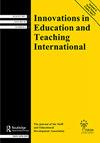Untangling the role of optimism, pessimism and coping influences on student mood, motivation and satisfaction
IF 4.9
4区 教育学
Q2 EDUCATION & EDUCATIONAL RESEARCH
Innovations in Education and Teaching International
Pub Date : 2023-09-22
DOI:10.1080/14703297.2023.2260780
引用次数: 1
Abstract
The study tested the associations between stress and coping on mood, course satisfaction and learning motivation. Undergraduate students (N = 175) were surveyed on student stressors, personality, support and control against mood, course satisfaction and motivation. Defensive pessimism, context control and agreeableness lowered anxiety. Neuroticism, extraversion and hassle ratings towards tutor support, increased it. Control and neuroticism mediated between stress ratings given to support from family and friends and anxiety. Optimism and defensive pessimism lowered depression scores. Those high in Defensive pessimism, compared to those high in optimism, scored lower on anxiety, higher on learning motivation and course satisfaction and this is despite the optimism group being higher in self-efficacy, control and conscientiousness. Both groups scored higher than the cohort average on GPA. The results suggest that context control, defensive pessimism and optimism all offer effective coping, with individual differences an important caveat – for those capable and high in anxiety, defensive pessimism was effective.揭示乐观、悲观和应对对学生情绪、动机和满意度的影响
本研究测试了压力与应对在情绪、课程满意度和学习动机上的关系。对175名大学生进行压力源、个性、情绪支持与控制、课程满意度和学习动机的调查。防御性悲观主义、环境控制和亲和性降低了焦虑。神经质、外向和对导师支持的麻烦评分增加了这一比例。控制和神经质在家庭和朋友给予支持的压力等级和焦虑之间起中介作用。乐观和防御性悲观会降低抑郁得分。那些防御性悲观情绪高的人,与那些乐观情绪高的人相比,在焦虑方面得分更低,在学习动机和课程满意度方面得分更高,尽管乐观情绪组在自我效能感、控制力和责任心方面得分更高。两组学生的平均绩点都高于同期学生的平均水平。结果表明,情境控制、防御性悲观主义和乐观主义都能有效应对,但个体差异是一个重要的警告——对于那些有能力且高度焦虑的人来说,防御性悲观主义是有效的。
本文章由计算机程序翻译,如有差异,请以英文原文为准。
求助全文
约1分钟内获得全文
求助全文
来源期刊

Innovations in Education and Teaching International
EDUCATION & EDUCATIONAL RESEARCH-
CiteScore
4.80
自引率
5.60%
发文量
68
期刊介绍:
Innovations in Education and Teaching International (IETI), is the journal of the Staff and Educational Development Association (SEDA) www.seda.ac.uk. As such, contributions to the Journal should reflect SEDA"s aim to promote innovation and good practice in higher education through staff and educational development and subject-related practices. Contributions are welcomed on any aspect of promoting and supporting educational change in higher and other post-school education, with an emphasis on research, experience, scholarship and evaluation, rather than mere description of practice.
 求助内容:
求助内容: 应助结果提醒方式:
应助结果提醒方式:


